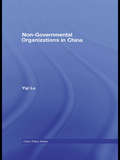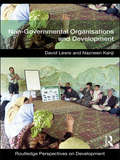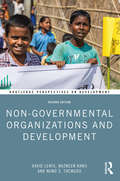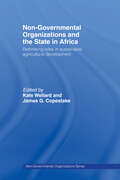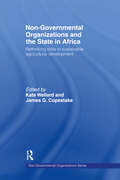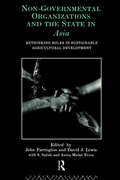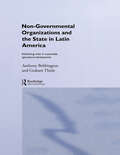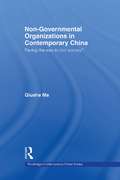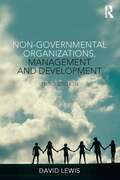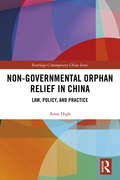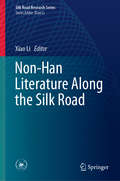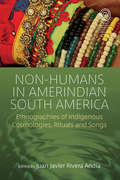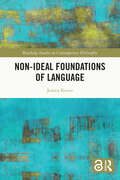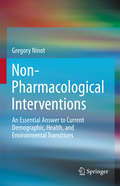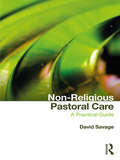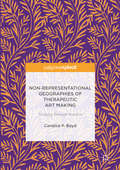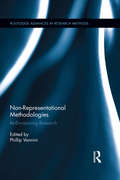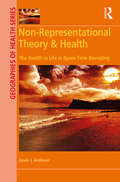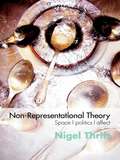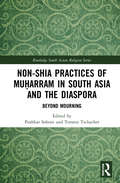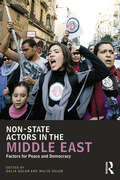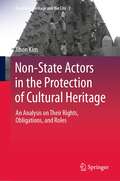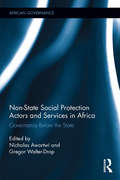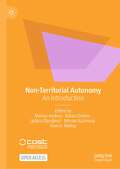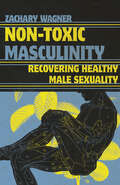- Table View
- List View
Non-Governmental Organisations in China (China Policy Series)
by Yiyi LuAs Chinese society becomes more open, and hopes rise that control by the Communist Party may become more relaxed, a great deal is expected from non-governmental organisations (NGOs) in the formation of civil society. This book, based on extensive original research including detailed interview research in over 40 Chinese NGOs, discusses the current position of NGOs within China. It argues that although all NGOs – both those originating as a result of government initiatives, and those which are popularly-organised – are dependent on the state, all enjoy a very large degree of autonomy. This autonomy arises in part because of the limited capacity of central government to control NGOs, and in part because of the fragmented and non-monolithic nature of the state, which enables individual bureaucratic patrons to protect particular NGOs, especially officially-organised ones, from the full impact of state control. The book also discusses the skill base of NGOs, showing that this is somewhat limited, and argues that, contrary to current hopes that NGOs and thereby civil society may flourish, the lack of state control is already leading to an "uncivil society" where rules do not exist or are ignored, and where organisations which are supposed to work for the public interest are being used to serve illegitimate private interests instead.
Non-Governmental Organizations and Development
by David Lewis Nazneen KanjiNon-governmental organizations (NGOs) are high profile actors in the field of international development, both as providers of services to vulnerable individuals and communities and as campaigning policy advocates. This book provides a critical introduction to the wide-ranging topic of NGOs and development. Written by two authors with more than twenty years experience of research and practice in the field, the book combines a critical overview of the main research literature with a set of up-to-date theoretical and practical insights drawn from experience in Asia, Europe, Africa and elsewhere. It highlights the importance of NGOs in development, but it also engages fully with the criticisms that the increased profile of NGOs in development now attracts. Non-Governmental Organizations and Development begins with a discussion of the wide diversity of NGOs and their roles, and locates their recent rise to prominence within broader histories of struggle as well as within the ideological context of neo-liberalism. It then moves on to analyze how interest in NGOs has both reflected and informed wider theoretical trends and debates within development studies, before analyzing NGOs and their practices, using a broad range of short case studies of successful and unsuccessful interventions. David Lewis and Nazneen Kanji then moves on to describe the ways in which NGOs are increasingly important in relation to ideas and debates about ‘civil society’, globalization and the changing ideas and practices of international aid. The book argues that NGOs are now central to development theory and practice and are likely to remain important actors in development in the years to come. In order to appreciate the issues raised by their increasing diversity and complexity, the authors conclude that it is necessary to deploy a historically and theoretically informed perspective. This critical overview will be useful to students of development studies at undergraduate and masters levels, as well as to more general readers and practitioners. The format of the book includes figures, photographs and case studies as well as reader material in the form of summary points and questions. Despite the growing importance of the topic, no single short, up-to-date book exists that sets out the main issues in the form of a clearly written, academically-informed text: until now.
Non-Governmental Organizations and Development (Routledge Perspectives on Development)
by David Lewis Nuno S. Themudo Nazneen KanjiThis book is an introduction to the wide-ranging topic of non-governmental organizations (NGOs) and development, combining a critical overview of the main research literature with a set of up-to-date theoretical and practical insights drawn from experience in Asia, Europe, Africa and elsewhere. The revised second edition highlights the continuing importance of NGOs in development, while fully engaging with the criticisms that their increased profile now attracts. It considers issues such as securitization, changing technologies, and recent concerns about safeguarding as well as going into more detail around topics such as market-based development and social enterprise. The diversity of NGOs and their roles is discussed against the broader historical background of struggles for social justice in different societies, as well as within the shifting ideological contexts of neoliberalism and populism. Using a broad range of short case studies of both successful and unsuccessful interventions, the authors analyze how interest in NGOs has both reflected and informed wider theoretical trends and debates within development studies. The book argues that NGOs are central to both development theory and practice and are likely to remain important actors for many years to come. This critical overview will be useful to students of development studies at undergraduate and master's levels in fields and disciplines as diverse as International Development Studies, International Relations, Geography, Anthropology, Global Studies, Politics and International Studies, as well as general readers and practitioners.
Non-Governmental Organizations and the State in Africa: Rethinking Roles in Sustainable Agricultural Development (Non-Governmental Organizations series)
by Kate Wellard James G. CopestakeThis presents twenty specially commissioned case studies of farmer participatory approaches to agricultural innovation initiated by NGOs in Africa. Beginning with a broad review of institutional activity at the grassroots, the authors set the case material within the context of NGO relations with the State and their contribution to democratisation and the consolidation of rural civil society. Specific questions are raised: how good/bad are NGOs at promoting technological innovation and addressing constraints to change in present agriculture?; how effective are NGOs at strengthening grassroots organizations? and how do/will donor pressures influence NGOs and their links to the State? This title is part of a series on Non-Governmental Organizations co-ordinated by the Overseas Development Institute. To complete this comprehensive review and critique there are two other regional case study volumes on Asia and Latin America and an overview volume, Reluctant Partners?
Non-Governmental Organizations and the State in Africa: Rethinking Roles in Sustainable Agricultural Development (Non-governmental Organizations Ser.)
by Kate Wellard James G. CopestakeThis presents twenty specially commissioned case studies of farmer participatory approaches to agricultural innovation initiated by NGOs in Africa. Beginning with a broad review of institutional activity at the grassroots, the authors set the case material within the context of NGO relations with the State and their contribution to democratisation and the consolidation of rural civil society. Specific questions are raised: how good/bad are NGOs at promoting technological innovation and addressing constraints to change in present agriculture?; how effective are NGOs at strengthening grassroots organizations? and how do/will donor pressures influence NGOs and their links to the State? This title is part of a series on Non-Governmental Organizations co-ordinated by the Overseas Development Institute. To complete this comprehensive review and critique there are two other regional case study volumes on Asia and Latin America and an overview volume, Reluctant Partners?
Non-Governmental Organizations and the State in Asia: Rethinking Roles in Sustainable Agricultural Development (Non-Governmental Organizations series)
by David J. Lewis John Farrington S. Satish Aurea Miclat-TevesFirst published in 1993. Routledge is an imprint of Taylor & Francis, an informa company.
Non-Governmental Organizations and the State in Latin America: Rethinking Roles in Sustainable Agricultural Development
by Anthony Bebbington, Graham Thiele, Penelope Davies, Martin Prager, Hernando RiverosThis presents twenty specially commissioned case studies of farmer participatory approaches to agricultural innovation initiated by NGOs in Latin America. Beginning with a broad review of institutional activity at the grassroots, the authors set the case material within the context of NGO relations with the State and their contribution to democratisation and the consolidation of rural civil society. Specific questions are raised: how good/bad are NGOs at promoting technological innovation and addressing constraints to change in present agriculture?; how effective are NGOs at strengthening grassroots organizations? and how do/will donor pressures influence NGOs and their links to the State? This title is part of a series on Non-Governmental Organizations co-ordinated by the Overseas Development Institute. To complete this comprehensive review and critique there are two other regional case study volumes on Asia and Africa and an overview volume, Reluctant Partners?
Non-Governmental Organizations in Contemporary China: Paving the Way to Civil Society? (Routledge Contemporary China Series #Vol. 6)
by Qiusha MaBased on documentary materials including interviews with key players in China, this book charts the development of non-governmental and non-profit organizations in China from the late 1970s to the present day. It recounts how in the aftermath of the 1978 reforms that created a market economy and diversified interests and social life, new institutions and organizations outside of the state system increased dramatically in number, size and influence. These organizations, which barely existed before the reforms began in the late 1970s, carry out many social, economic and cultural tasks neglected by the government. Qiusha Ma examines two key questions crucial to understanding the development of NGOs in China: First, is it possible under China’s one-party state for non-governmental organizations to thrive and play important economic, social and political functions? And secondly, are NGOs facilitating the formation of a civil society in China?
Non-Governmental Organizations, Management and Development: An Introduction (Routledge Studies In The Management Of Voluntary And Non-profit Organizations Ser.)
by David LewisNon-Governmental Development Organizations have seen turbulent times over the decades; however, recent years have seen them grow to occupy high-profile positions in the fight against poverty. They are now seen as an important element of ‘civil society’, a concept that has been given increasing importance by global policy makers. This book has evolved during the course of that period to be a prime resource for those working (or wishing to work) with and for NGOs. The third edition of Non-Governmental Organizations, Management and Development is fully updated and thoroughly reorganized, covering key issues including, but not limited to, debates on the changing global context of international development and the changing concepts and practices used by NGOs. The interdisciplinary approach employed by David Lewis results in an impressive text that draws upon current research in non-profit management, development management, public management and management theory, exploring the activities, relationships and internal structure of the NGO. This book remains the first and only comprehensive and academically grounded guide to the issues facing international development NGOs as they operate in increasingly complex and challenging conditions around the world. It is the perfect resource for students undertaking studies of NGOs and the non-profit sector, in addition to being an excellent resource for development studies students more generally.
Non-Governmental Orphan Relief in China: Law, Policy, and Practice (Routledge Contemporary China Series)
by Anna HighBased on field studies and in-depth interviews across rural and urban China, this book presents a socio-legal analysis of non-state organised care for some of China's most vulnerable children. The first full-length book to examine non-state organised care of modern China's ‘lonely children’ (gu'er), this book describes the context in which abandonment occurs and the care provided to children unlikely to be adopted because of their disability. It also explores the various faith groups and humanitarian workers providing this care in private orphanages and foster homes in response to perceived deficiencies in the state orphanage system, in the context of a broader societal shift from ‘welfare statism’ to ‘welfare pluralism’. Formal law and policy has not always kept pace with this shift. This study demonstrates that, in practice, state regulation of these unauthorised care providers has mostly centred on local-level negotiations, hidden rules, and discretion, with mixed outcomes for children. However there has also been a recent shift towards tighter state control and clearer laws, policies, and standards. This timely research sheds light on the life paths and stories of today's ‘lonely children’ and the changing terrain of civil society, humanitarianism, policy-making, and state power in modern China. As such, this book will appeal to students and scholars of Asian and Chinese studies, law and society, NGOs, and comparative social and child welfare.
Non-Han Literature Along the Silk Road (Silk Road Research Series)
by Xiao LiThis volume includes outstanding scientific articles on documents written in ancient languages such as Tocharian, Sogdian, Khotanese, and Old Uyghur. Its chief aims are to contribute to the present state of research by adding essential findings on newly discovered historical documents; to present a multi-dimensional investigation of diverse aspects including the history, religion, art, literature, and social life along the Silk Road; and to outline potential future research directions for non-Han literature studies and inspire research into other aspects, such as economics and comparative studies.
Non-Humans in Amerindian South America: Ethnographies of Indigenous Cosmologies, Rituals and Songs (EASA Series #37)
by Juan Javier Rivera AndíaDrawing on fieldwork from diverse Amerindian societies whose lives and worlds are undergoing processes of transformation, adaptation, and deterioration, this volume offers new insights into the indigenous constitutions of humanity, personhood, and environment characteristic of the South American highlands and lowlands. <P><P>The resulting ethnographies – depicting non-human entities emerging in ritual, oral tradition, cosmology, shamanism and music – explore the conditions and effects of unequally ranked life forms, increased extraction of resources, continuous migration to urban centers, and the (usually) forced incorporation of current expressions of modernity into indigenous societies.
Non-Ideal Foundations of Language (Routledge Studies in Contemporary Philosophy)
by Jessica KeiserThis book argues that the major traditions in the philosophy of language have mistakenly focused on highly idealized linguistic contexts. Instead, it presents a non-ideal foundational theory of language that contends that the essential function of language is to direct attention for the purpose of achieving diverse social and political goals. Philosophers of language have focused primarily on highly idealized linguistic contexts in which cooperative agents are working toward the shared goal of gaining information about the world. This approach abstracts away from important issues like power, ideology, social position, and diversity of goals which are crucial to explaining linguistic phenomena both at the semantic and pragmatic levels. This book begins by examining the work of some of the pioneers of this tradition—primarily David Lewis, Paul Grice, and Robert Stalnaker. The author shows that various problems have their source in idealizations made at the foundational level of linguistic theory and proposes to rebuild from the ground-up. She presents a non-ideal foundational theory of language which retains the major insights of traditional frameworks while rejecting the social idealizations that guide them. Then, she explores the social and political applications of her account to issues such as dog whistling, propaganda, racist speech, silencing, and manipulation. Non-Ideal Foundations of Language will appeal to researchers and advanced students in philosophy of language who are interested in the social and political applications of language, as well as traditional metasemantic theory.
Non-Pharmacological Interventions: An Essential Answer to Current Demographic, Health, and Environmental Transitions
by Gregory NinotNon-pharmacological interventions (NPIs) have become essential solutions for better living, preventing disease, and self-care, in addition to biomedical treatments, and for increasing longevity without loss of quality of life. Over the past 20 years, these practices have gone from general diet and hygiene advice to targeted and personalized solutions for prevention, care optimization, and curative treatments. Selected empirically for centuries or recently with the help of technological innovations and epigenetic, interventional, and medico-economic studies, their development is growing and diversifying around the world. Today an NPI ecosystem is made up of a myriad of public and private actors. As interest in NPIs grows, so do questions about safety, effectiveness, standardization, ethical practice, and surveillance. In this book, the author answers these questions with a scientific approach, because evidence-based science, evidence-based practice, clinical research, and data monitoring have revolutionized this field. Topics explored among the chapters include: · Defining Non-Pharmacological Interventions · The Benefits and Dangers of Non-Pharmacological Interventions · Motives and Facilitators of Non-Pharmacological Intervention Use · The Market for Non-Pharmacological Interventions · Evaluation of Non-Pharmacological Interventions · The Future of Non-Pharmacological Interventions Non-Pharmacological Interventions: An Essential Answer to Current Demographic, Health, and Environmental Transitions is a must-have resource for clinicians and other health professionals, researchers, students, health insurers, policy-makers, caregivers, and entrepreneurs in the health and wellness space, as well as any users who wish to inform themselves about NPIs.
Non-Religious Pastoral Care: A Practical Guide
by David SavageThis ground-breaking book is a guide to non-religious pastoral care practice in healthcare, prisons, education, and the armed forces in the UK. It brings a new perspective to our understanding of care services traditionally offered by chaplaincy departments. The book charts the progress from a Christian to a multi-faith and on to a fully inclusive care service. Compelling evidence is presented showing strong and broad support for non-religious pastoral care provision. A practical guide, it outlines the beliefs and values on which this care is founded and its person-centred approach. The role, skills, competencies, and training requirements for non-religious pastoral carers are described. Institutions need to consider their policy responses to the rapid development of non-religious pastoral care provision. A number of policy aspects are explored, including understanding service users’ needs, recruitment, and communications. This book is essential reading for non-religious pastoral carers and those thinking of entering this field. Chaplains and institutional managers responsible for chaplaincy or spiritual care departments will find this book gives them valuable insights into the positive contribution non-religious pastoral carers can make in building stronger, more inclusive pastoral, spiritual, and religious care services.
Non-Representational Geographies of Therapeutic Art Making
by Candice P. BoydUtilising non-representational theories and practice-led research methods, this book serves to reclaim therapeutics as ecological, spatial and material. It examines the sites and performances of a wide range of therapeutic art practices, including painting and drawing, dance movement therapy, fibre art, subterranean graffiti practice, and poetic permaculture. In doing so it provides an important assessment of the role and status of therapy in contemporary life. A highly interdisciplinary text, Boyd’s research is informed by a thorough reading of post-structural theory including contemporary feminism, Guattari’s ethico-aesthetic paradigm, Whitehead’s process-oriented ontology, and Deleuze’s writing on sense and the event. This innovative study will prove essential for scholars and practitioners of cultural geography, socially-engaged art, therapeutic studies, and occupational therapy.
Non-Representational Methodologies: Re-Envisioning Research (Routledge Advances in Research Methods)
by Phillip VanniniNon-representational theory is one of the contemporary moment’s most influential theoretical perspectives within social and cultural theory. It is now widely considered to be the logical successor of postmodern theory, the logical development of post-structuralist thought, and the most notable intellectual force behind the turn across the social and cultural sciences away from cognition, meaning, and textuality. And yet, it is often poorly understood. This is in part because of its complexity, but also because of its limited treatment in the few volumes chiefly dedicated to it. Theories must be useful to researchers keen on utilizing concepts and analytical frames for their personal interpretive purposes. How useful non-representational theory is, in this sense, is yet to be understood. This book outlines a variety of ways in which non-representational ideas can influence the research process, the very value of empirical research, the nature of data, the political value of data and evidence, the methods of research, the very notion of method, and the styles, genres, and media of research.
Non-Representational Theory & Health: The Health in Life in Space-Time Revealing (Geographies of Health Series)
by Gavin J. AndrewsNon-representational theory is an academic approach that animates the active world; its taking-place. It shows how material, sensory and affective processes combine with conscious thought and agency in the making of everyday life. This book offers an agenda for health geography, providing the first comprehensive overview of what a ‘more-than-representational’ health geography looks like. It outlines the basis of a new ontological understanding of health, and explores the key qualities of ‘movement-space’ that are critical to how health emerges within the assemblages that enable it. It shows how non-representational events and concerns are key to human happiness and wellbeing, to the experience of health and disease, to activities that add to or detract from health and to health care work, not to mention to the broader initiatives and operation of health institutions and health sciences. This book bridges the gap between non-representational theory and health research, and provides the groundwork for future developments in the field. It will be of interest to students, researchers and professionals alike working in health, geography and a range of other disciplines.
Non-Representational Theory: Space, Politics, Affect (International Library of Sociology)
by Nigel ThriftThis astonishing book presents a distinctive approach to the politics of everyday life. Ranging across a variety of spaces in which politics and the political unfold, it questions what is meant by perception, representation and practice, with the aim of valuing the fugitive practices that exist on the margins of the known. It revolves around three key functions. It: introduces the rather dispersed discussion of non-representational theory to a wider audience provides the basis for an experimental rather than a representational approach to the social sciences and humanities begins the task of constructing a different kind of political genre. A groundbreaking and comprehensive introduction to this key topic, Thrift’s outstanding work brings together further writings from a body of work that has come to be known as non-representational theory. This noteworthy book makes a significant contribution to the literature in this area and is essential reading for researchers and postgraduates in the fields of social theory, sociology, geography, anthropology and cultural studies.
Non-Shia Practices of Muḥarram in South Asia and the Diaspora: Beyond Mourning (Routledge South Asian Religion Series)
by Pushkar Sohoni and Torsten TschacherThis book analyses engagements with non-Shia practices of Muḥarram celebrations in the past and present, in South Asia and within a larger diaspora. Breaking new ground by bringing together a variety of regional perspectives (the Deccan, the Punjab, Singapore, South Africa, and Trinidad and Tobago) and linguistic backgrounds (Bhojpuri, Gujarati, Marathi, Punjabi, Tamil, Urdu), the chapters discuss the importance of Muḥarram celebrations in terms of their respective actors. While in some cases these include an interrelationship with Shia Muslims and their traditions of mourning during Muḥarram, other contributions address contexts in which Shias, and even Muslims, form only a minor component of the celebrations, or even none at all. Focusing on Muḥarram celebrations that are beyond the script provided by Shia Muḥarram practices, this book opens up new perspectives on Muḥarram as a social practice widely shared by South Asians across regions. The book will be a key resource to scholars and students of South Asian studies, Asian religion, in particular rituals and religious practices, and Islamic studies but also engaging to non-academic readers interested in the practices of several regions.
Non-State Actors in the Middle East: Factors for Peace and Democracy (UCLA Center for Middle East Development (CMED) series)
by Galia Golan Walid SalemAs the recent revolutions in the Middle East have demonstrated, civil society in this part of the world is on the move. The increasingly important role of non-state actors – a phenomenon of globalization- has characterized developments throughout the region, affecting the struggle for democracy and for peace. This volume brings together scholars primarily form the region to analyse the varied activities and contributions of NGOs, the private sector and the new media, from Morocco to Iran, along with the involvement of diaspora groups. The chapter on facebook in the recent Egyptian revolution captures the role of this new media while the study on similar technology in Iran outlines the barriers raised by the authorities in the current struggles there. Even the fledgling process of democratization in Saudi Arabia is driven by non-state actors while the veteran women's movements in the Maghreb serve as an example for the post-Arab spring era in those countries. Providing one of the first assessments of the role of non-state actors in the Middle East, this book will be essential reading for students of Political Science, Sociology and Civil Society, amongst others.
Non-State Actors in the Protection of Cultural Heritage: An Analysis on Their Rights, Obligations, and Roles (Creativity, Heritage and the City #3)
by Jihon KimThis book provides a comprehensive overview of international cultural heritage law from the perspectives of non-state actors (NSAs). In keeping with the significant developments concerning the status and roles of NSAs in international law over the last century, NSAs such as communities, experts, NGOs, and international organizations have become important participants in the implementation of international cultural heritage conventions. Indeed, due to the emergence of new ideas on common heritage and cultural rights in the 20th century, international cultural heritage law has become inconsistent with States’ claim to sole authority regarding the protection of cultural heritage. The author analyzes the texts of international cultural heritage conventions, as well as their operational texts, to track essential changes in the rights, obligations, and roles of NSAs since the mid-20th century. Practical cases on the status and roles of NSAs are introduced to glean empirical ideas and facilitate an in-depth understanding of their effectiveness. The analysis reveals that NSAs do have certain rights and responsibilities concerning the implementation of cultural heritage conventions, and their roles have been increasingly recognized. At the same time, however, discrepancies between text and practice can be observed when it comes to the status and roles of NSAs. They have emerged for various reasons, one of which is the politicization of conventions’ governance. Adopting the standpoint of the NSAs, the book emphasizes the need to explore innovative and practical mechanisms that will allow NSAs to attain their proper status and take on practical roles under international cultural heritage law, which will in turn ensure the sustainable protection of cultural heritage. This message becomes more pertinent to the current conflicts where various tensions between states and NSAs have arisen and the roles of NSAs have become more important.Given its scope, the book will be of special interest to students, researchers and professionals at government and non-government organizations in the fields of heritage, the arts, law, administration, and development.
Non-State Social Protection Actors and Services in Africa: Governance Below the State (African Governance)
by Nicholas Awortwi Gregor Walter-DropFor millions of Africans, the social situation is dire. Over half of the population of Sub-Sahara Africa do not have access to improved sanitation facilities, and about a quarter are undernourished. If factors such as armed conflicts in the region, the impact of climate change, or the widespread presence of a broad range of infectious agents are considered, it shows a large number of Africans living in very fragile circumstances, highly vulnerable to any kind of shock or rapid change. Small, informal community groups deliver the majority of social protection services in Africa, but most of these are disqualified from official recognition, support or integration with state systems because they do not "fit" the modern management model of accountability. The studies in this book challenge that verdict. This book outlines insightful and valuable research generated by teams of established scholars. It is divided into nine studies exploring the governance of non-state actors in Ethiopia, Ghana, Kenya, Senegal, Tanzania and Uganda. It examines the numerous self-help groups and their effectiveness, and argues that if the modern management model is right – why do so many Africans avoid interacting with it? The book provides a warning against undermining what is possibly the single greatest social protection resource throughout Africa in the name of "reform", and suggests that the modern welfare establishment needs to adapt to (and learn from) self-help groups - not the other way around. Non-State Social Protection Actors and Services in Africa will be of interest to donors, policy makers, practitioners, and students and scholars of African Studies, social policy and politics.
Non-Territorial Autonomy: An Introduction
by Tove H. Malloy Marina Andeva Balázs Dobos Ljubica Djordjević Börries KuzmanyThis Open Access textbook is a result of the work of ENTAN – the European Non-Territorial Autonomy Network. It provides students with a comprehensive analysis of the different aspects and issues around the concept of non-territorial autonomy (NTA). The themes of each chapter have been selected to ensure a multi- and interdisciplinary overview of an emerging research field and show both in theory and in practice the possibilities of NTA in addressing cultural, ethnic, religious and language differences in contemporary societies. This is an open access book.
Non-Toxic Masculinity: Recovering Healthy Male Sexuality
by Zachary WagnerDismissals such as "boys will be boys" and "not all men" are ingrained in our world. And the purity culture of our youth sold the same excuses with a spiritual spin. Can we break the toxic cycle and recover a healthy identity for men? In Non-Toxic Masculinity, Zachary Wagner tells men, "If you are in Christ, this is your problem—and you should be part of the solution." Reflecting on his own coming of age in the purity culture movement and ongoing recovery from sexual shame, Wagner confronts harmful teaching from the American church that has distorted desire, sex, relationships, and responsibility. For those—both men and women—who feel disillusioned and adrift, this book offers a renewed vision for Christian male sexuality founded in empathy and selflessness.
